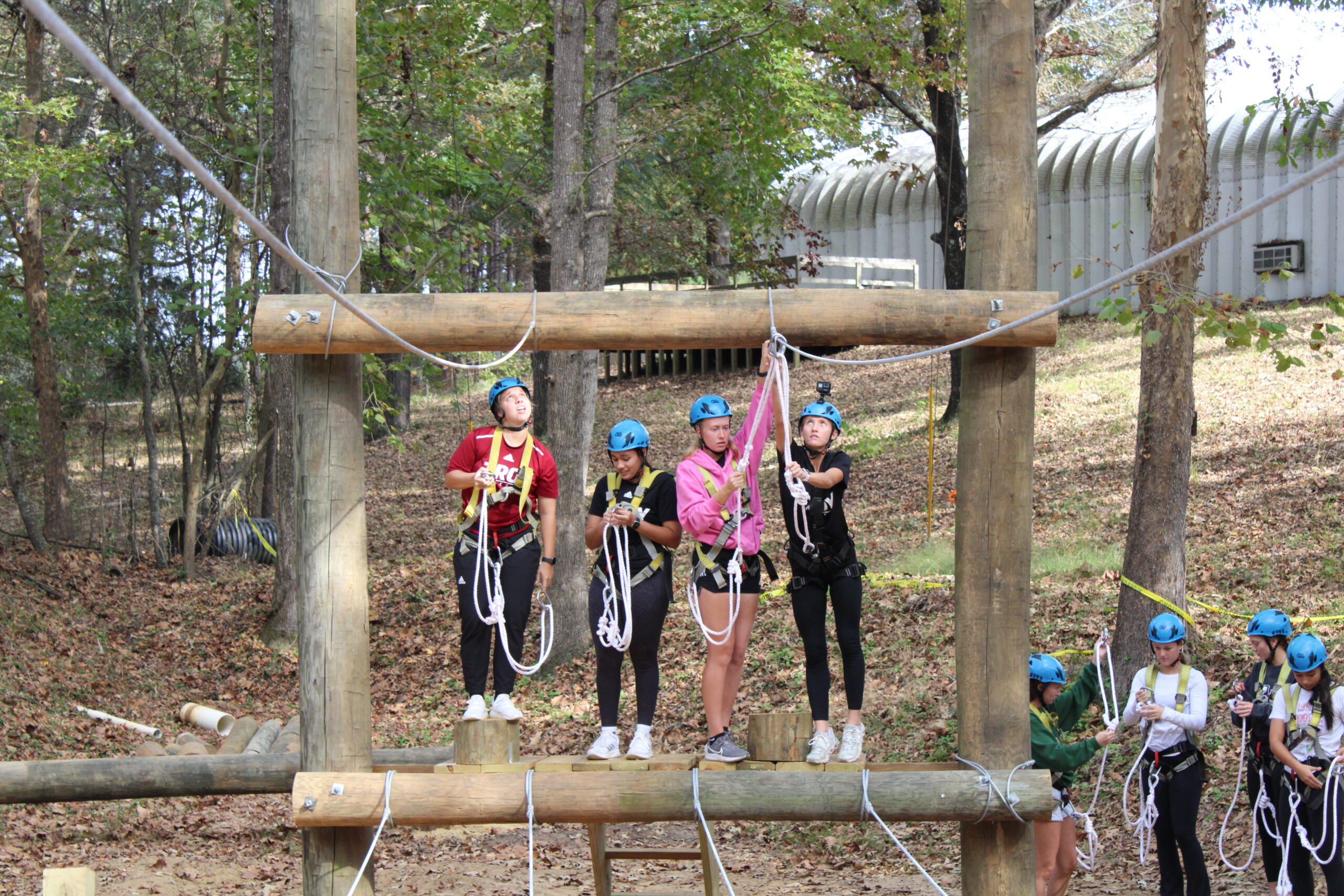Open Your Team's Potential with a Dynamic Challenge Course in Alabama
Open Your Team's Potential with a Dynamic Challenge Course in Alabama
Blog Article
Discover the Power of Cooperation With a Group Difficulty Training Course Journey
Starting a group difficulty training course experience can use a special opportunity for people to witness firsthand the transformative impact of partnership within a group setting. As groups navigate via numerous obstacles and jobs, real power of team effort unravels, exposing the capacity for boosted communication, strategic planning, and friendship (Team Challenge Course in Alabama). By taking part in these experiential discovering atmospheres, participants are presented with a system to check out the depths of their collaborative capabilities and uncover brand-new methods to conquer difficulties jointly
Advantages of Team Challenge Courses
Involving in team challenge courses promotes partnership and boosts interaction skills among individuals. One substantial benefit of participating in group obstacle programs is the improvement of synergy skills.
Additionally, team challenge training courses also help in developing leadership abilities. As individuals encounter various challenges throughout the program, individuals commonly naturally take on management functions based upon their toughness and abilities (Team Challenge Course in Alabama). This hands-on experience enables them to exercise decision-making, analytic, and delegation within a helpful atmosphere
Furthermore, these courses advertise count on and sociability amongst staff member. By relying upon each other to overcome challenges, individuals build count on and establish stronger partnerships. This sense of camaraderie extends past the program, favorably impacting synergy and cooperation in different settings, consisting of the work environment.
Enhancing Group Communication Skills
In the context of team obstacle programs, the development of efficient team communication abilities plays a critical duty in optimizing collaborative efforts and achieving shared objectives. Succinct and clear interaction is necessary for teams to successfully navigate the obstacles provided in these training courses. By improving communication skills, employee can convey their concepts, pay attention actively to others, offer feedback constructively, and collaborate their actions successfully.
Reliable interaction fosters a helpful environment where staff member really feel comfortable expressing their ideas, requesting for help when needed, and offering aid to their peers. It aids in developing trust among employee, which is vital for smooth cooperation and problem-solving. In addition, boosted communication lowers the chance of misconceptions, problems, and mistakes that can emerge when messages are vague or misinterpreted.
Via team obstacle training courses that emphasize communication skills, participants can exercise various types of interaction, such as spoken, non-verbal, and active listening. These experiences not just enhance team effort during the program however likewise offer useful abilities that can be moved to the individuals' expert and individual lives.
Techniques for Reliable Partnership
What are the essential techniques that promote effective cooperation amongst team members in difficult environments? Reliable cooperation in tough settings calls for clear interaction, shared respect, and a common vision. One critical technique is establishing open lines of interaction where staff member feel comfy revealing their ideas, worries, and comments. Motivating active listening amongst group participants ensures that every person's viewpoints are heard and valued, leading to more enlightened decision-making procedures.

Setting clear objectives and assumptions is also important for efficient collaboration in difficult environments. When group members understand what is anticipated of them and have a clear roadmap to comply with, they can align their efforts in the direction of a common purpose. On a regular basis assessing development, supplying positive responses, and making required adjustments in the process are essential components of successful collaboration in challenging atmospheres.
Conquering Obstacles Together
To successfully browse and dominate obstacles as a natural system, groups have to use the strategies for effective partnership focused in challenging environments. When faced with barriers throughout a team challenge program journey, people have to collaborate, bring into play each employee's toughness to get over the hurdles collectively. Communication plays a crucial function in this procedure, as staff member should properly convey concepts, listen actively, and give assistance to each other. By promoting a setting of open communication, groups can address challenges head-on, brainstorm remedies, and adjust swiftly to altering conditions.
Each group member brings a distinct perspective and ability established to the table, enabling for a varied variety of analytic approaches. Through collaboration, shared obligation, and a supportive group dynamic, teams can navigate difficulties with confidence and arise more powerful and a lot more joined on the various other side.

Structure Depend On and Sociability
Establishing a foundation of depend click for info on and sociability amongst group members is critical for promoting a collaborative and helpful environment conducive to getting over obstacles with each other. Trust develops the basis of effective interaction, allowing team members to feel safe revealing their concepts, worries, and comments. When individuals rely on each other, they are most likely to team up freely, share sources, and job towards typical objectives. Friendship, on the other hand, enhances the psychological bonds within a group, leading to raised spirits, loyalty, and a feeling of belonging.
Building count on and camaraderie often entails appealing in common experiences that require teamwork, communication, and common support. Group difficulty programs supply an exceptional opportunity for teams to bond through encountering psychological and physical obstacles together. These experiences develop long-term memories and inside jokes that reinforce the team's unity and cohesion. By spending effort and time into tasks that promote count on and camaraderie, teams can create a strong structure that improves their capability to work with each other efficiently and achieve success.
Verdict
To conclude, group challenge training courses provide countless advantages for enhancing communication skills, creating effective cooperation methods, overcoming challenges with each other, and building trust and friendship among employee. By taking part in these adventure programs, teams can reinforce their partnerships, enhance their problem-solving capacities, and work together much more effectively in the direction of usual goals. Partnership is an effective tool that can cause higher success and cohesion within a group.

Group obstacle programs give an exceptional chance for teams to bond through read this facing psychological and physical challenges together.In verdict, group challenge training courses offer various advantages for enhancing interaction skills, developing effective partnership approaches, conquering barriers together, and building depend on and friendship amongst group members.
Report this page